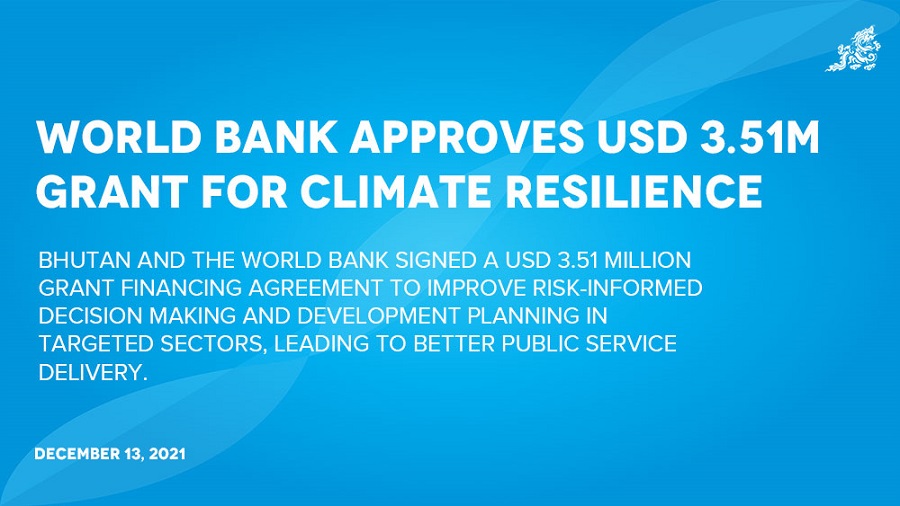
Bhutan and the World Bank signed a USD 3.51 million grant financing agreement to improve risk-informed decision making and development planning in targeted sectors, leading to better public service delivery.
World Bank Resident Representative for Bhutan, Dr Adama Coulibaly and Finance Minister Namgay Tshering signed the agreement yesterday.
The Strengthening Risk Information for Resilience project will generate nationwide climate and disaster risk information through a first-of-its-kind multi-hazard risk assessment. It is expected to help develop an innovative and risk-informed decision support system by integrating risk information in targeted sectors such as infrastructure and construction.
“This project will strengthen the support system that helps protect against preventable losses due to multiple hazards,” said Dr Adama Coulibaly.
Due to its geographical location, Bhutan remains highly vulnerable to natural hazards, including flooding, landslides, glacier lake outburst floods, earthquakes, and forest fires. Climate change is further increasing the country’s vulnerability to natural disasters and extreme weather events.
The project will help strengthen Hydromet and Agromet service delivery and provide agro-meteorological advisories to approximately 5,140 households in 11 gewogs.
The project will increase the weather forecast range from three days to 10 days; enhance pest advisories and disease forecasting, and organise climate field schools for farmers.
A press release from the World Bank office in Bhutan stated that the project will undertake a detailed survey of landslide hotspots along road networks using drones. “This will help the Department of Roads make better risk-informed transport planning and investment decisions.” The project will identify and prioritise vulnerable dzongkhags and communities and strengthen their disaster risk management capacity.
Building on the ongoing World Bank financed operations, the press release stated that the project will also support the formulation of transformational policy and institutional reforms to strengthen the legal and regulatory foundations for long term resilience in the country.
Finance Minister Namgay Tshering said, “This project is aligned with the 12th Five-Year Plan and the Bhutan Economic Contingency Plan 2020. At a time like this when the country is already facing the hardship of fighting the protracted Covid-19 pandemic, strengthening Bhutan’s resilience and capacity to respond to natural disasters is a national priority.”
The project is funded through three grants from the Pilot Program for Climate Resilience under the Strategic Climate Fund, the Japan-World Bank Program for Mainstreaming Disaster Risk Management in Developing Countries, and the European Union-South Asia Capacity Building for Disaster Risk Management.



